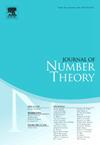Newspaces with nebentypus: An explicit dimension formula and classification of trivial newspaces
IF 0.7
3区 数学
Q3 MATHEMATICS
引用次数: 0
Abstract
Consider , , and χ a Dirichlet character modulo N such that . For any bound B, one can show that for only finitely many triples . It turns out that this property does not extend to the newspace; there exists an infinite family of triples for which . However, we classify this case entirely. We also show that excluding the infinite family for which , for only finitely many triples . In order to show these results, we derive an explicit dimension formula for the newspace . We also use this explicit dimension formula to prove a character equidistribution property and disprove a conjecture from Greg Martin that takes on all possible non-negative integers.
具有网络属性的报纸:琐碎报纸的显式维度公式和分类
考虑N≥1,k≥2,且χ a狄利克雷特征模N使得χ(−1)=(−1)k。对于任意界B,可以证明对于有限多个三元组(N,k,χ), dim (Sk(Γ0(N),χ)≤B。事实证明,这一性质并不适用于新空间;存在一个无限的三元组族(N,k,χ),其中dim (Γ0(N),χ)=0。然而,我们把这种情况完全分类。我们还证明,对于有限多个三元组(N,k,χ),排除dim (Sknew(Γ0(N),χ)=0的无限族,dim (Sknew(Γ0(N),χ)≤B。为了显示这些结果,我们推导出新空间Sknew的显式维度公式(Γ0(N),χ)。我们还使用这个显式维数公式证明了一个特征均匀分布性质,并反驳了Greg Martin关于dim (S2new(Γ0(N))取所有可能的非负整数的猜想。
本文章由计算机程序翻译,如有差异,请以英文原文为准。
求助全文
约1分钟内获得全文
求助全文
来源期刊

Journal of Number Theory
数学-数学
CiteScore
1.30
自引率
14.30%
发文量
122
审稿时长
16 weeks
期刊介绍:
The Journal of Number Theory (JNT) features selected research articles that represent the broad spectrum of interest in contemporary number theory and allied areas. A valuable resource for mathematicians, the journal provides an international forum for the publication of original research in this field.
The Journal of Number Theory is encouraging submissions of quality, long articles where most or all of the technical details are included. The journal now considers and welcomes also papers in Computational Number Theory.
Starting in May 2019, JNT will have a new format with 3 sections:
JNT Prime targets (possibly very long with complete proofs) high impact papers. Articles published in this section will be granted 1 year promotional open access.
JNT General Section is for shorter papers. We particularly encourage submission from junior researchers. Every attempt will be made to expedite the review process for such submissions.
Computational JNT . This section aims to provide a forum to disseminate contributions which make significant use of computer calculations to derive novel number theoretic results. There will be an online repository where supplementary codes and data can be stored.
 求助内容:
求助内容: 应助结果提醒方式:
应助结果提醒方式:


